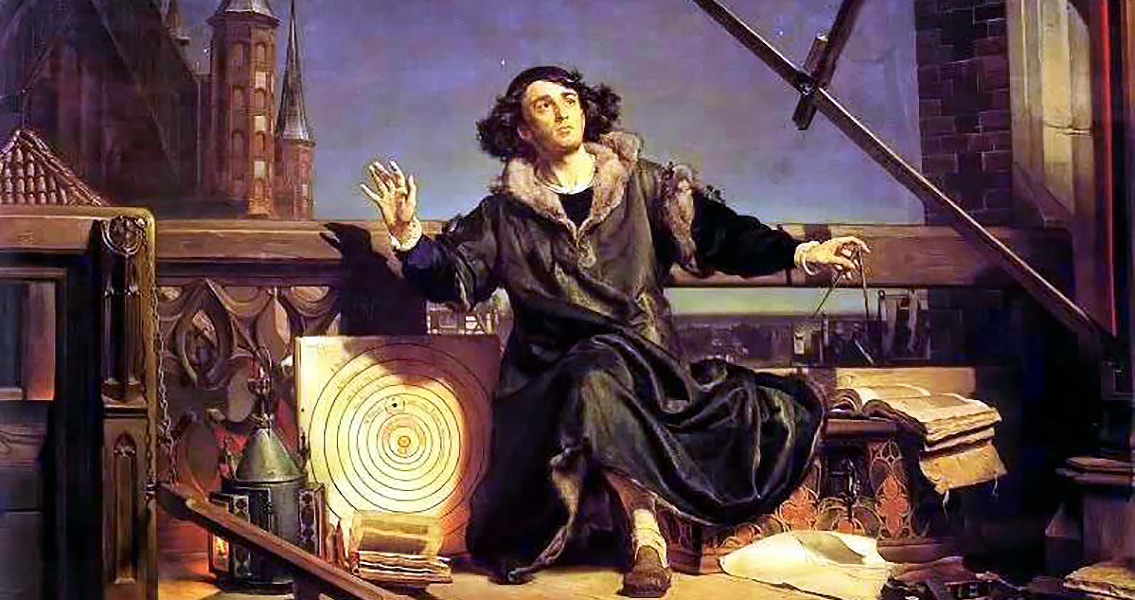<![CDATA[On the 19th February 1473, Nicolaus Copernicus was born in Torun, central Poland. A key figure in the development of our understanding of astronomy, he was the first scientist to prove that the earth and other planets revolved around the sun. Prior to Copernicus' groundbreaking work in the early sixteenth century, astronomers generally worked on the assumption that the earth was a stationary body, with all of the other celestial bodies (Sun, moon, and planets) orbiting around it. Since ancient times, philosophers had known that the planets moved through space in circular patterns, but they had assumed the circles were perfectly round, which failed to explain the occasionally eccentric motion of the planets. In the second century CE, Ptolemy had argued that celestial bodies moved in smaller circles around much larger circles, at different speeds, providing the first explanation for the irregular movement of moons and planets. His celestial system, which claimed that the earth was stationary while other bodies were in motion, corresponded with most astronomical observations on record, making it the basis of astronomy for the next thousand years. Born into a family of wealthy merchants, Copernicus was afforded a life of significant opportunity, allowing him access to the best education available at the time. After the death of his father, Copernicus was taken under the wing of his uncle, a local bishop. Copernicus studied Liberal Arts at the University of Krakow, a course which included astronomy, before going to Italy to study Medicine and Law. In 1503, after receiving his doctorate in canon law, Copernicus returned to Poland where he worked as a church administrator and doctor. His spare time was devoted to scientific pursuits, including the study of astronomy. By 1514, his reputation as an astronomer had grown to such a level that he was consulted by church leaders over their attempts to reform the Julian calendar. Copernicus' great contribution to the study of astronomy was to link it to mathematics, physics and cosmology. He appreciated the Ptolemic system, agreeing that its mathematical reasoning was sound, even if the assumption it was based on was inaccurate. On the other hand, astronomers since Ptolemy had advocated the idea that the Sun was the centre of the solar system, rather than the Earth, but they had failed to supply mathematical proofs for their ideas. In 'De Revolutionibus', Copernicus worked out his system for the balance of the solar system in full mathematical detail. The work provided a revolutionary explanation for astronomical phenomena, and proved a crucial step in the understanding of the inter-relation between the sciences. It would go on to serve as a basis for the work of Isaac Newton and Johannes Kepler, who both used Copernicus' principles to develop an understanding of the fundamental laws which govern the universe. Of course, Copernicus was a victim of his time, and his work was rejected by the Catholic Church. Indeed, although Copernicus had already discussed his ideas in an earlier work, De Revolutionibus itself would not be published until the year after his death. Like many other scientists from this period, Copernicus was reluctant to publicly advocate his ideas, for fear they would be deemed as contradictory to scripture. This reluctance serves as a poignant reminder of the power dogmatic institutions could wield in the sixteenth century. Copernicus played a key role in our understanding of astronomy. On the day of his birthday, it is a good time to consider just how fundamental his work has been to modern science, and how crucial it has been in forming even the most basic ideas we have about space. Image: Copernicus, by Jan Matejko ]]>
Copernicus' Birthday
